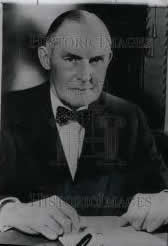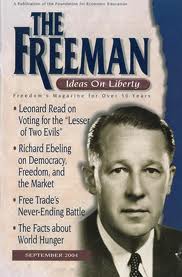 In 1946 seven men met in the New York office of David Goodrich (pictured), Chairman of B.F. Goodrich Company. They included a business association executive, Leonard Reed, Donaldson Brown of General Motors, Henry Hazlitt of the New York Times and Claude Robinson of the Opinion Research Corporation, as well as Goodrich himself. This was the beginning of the Foundation for Economic Education (FEE), an organisation that is dedicated to advancing individual economic freedom, private property, limited government and free trade through ‘economic education’. It was possibly the earliest free-market think tank and certainly provided a model for subsequent free market think tanks both in the US and internationally.
In 1946 seven men met in the New York office of David Goodrich (pictured), Chairman of B.F. Goodrich Company. They included a business association executive, Leonard Reed, Donaldson Brown of General Motors, Henry Hazlitt of the New York Times and Claude Robinson of the Opinion Research Corporation, as well as Goodrich himself. This was the beginning of the Foundation for Economic Education (FEE), an organisation that is dedicated to advancing individual economic freedom, private property, limited government and free trade through ‘economic education’. It was possibly the earliest free-market think tank and certainly provided a model for subsequent free market think tanks both in the US and internationally.
Goodrich became FEE’s chair, Hazlitt became its vice-president, economist Ludwig von Mises was appointed its economic advisor, and Read became FEE’s president and its driving force. Reed had been general manager of the Los Angeles Chamber of Commerce and then Executive Vice President of the National Industrial Conference Board (a creation of the National Association of Manufacturers—NAM). Read found both organizations to be too moderate for his liking but his work with them supplied him with valuable corporate contacts.
 FEE was set up with the support of twenty of the largest corporations in the US including General Motors, Chrysler, Southern California Edison, DuPont, and various oil and steel companies. Some 46 corporations had contributed a million dollars to FEE by the end of 1949. FEE also raised money by selling literature promoting free enterprise. Its articles were used by hundreds of newspapers and magazines, and Reader’s Digest was particularly keen on reprinting its articles. As the years went by FEE’s goals and leadership overlapped with that of the far-right John Birch Society, which was subsequently formed in 1958 by Robert Welch, a former long-term NAM director and chair of its Educational Advisory. However whilst many of the FEE’s corporate donors would not want to be seen to be funding the John Birch Society, the FEE was a respectable target of their generosity.
FEE was set up with the support of twenty of the largest corporations in the US including General Motors, Chrysler, Southern California Edison, DuPont, and various oil and steel companies. Some 46 corporations had contributed a million dollars to FEE by the end of 1949. FEE also raised money by selling literature promoting free enterprise. Its articles were used by hundreds of newspapers and magazines, and Reader’s Digest was particularly keen on reprinting its articles. As the years went by FEE’s goals and leadership overlapped with that of the far-right John Birch Society, which was subsequently formed in 1958 by Robert Welch, a former long-term NAM director and chair of its Educational Advisory. However whilst many of the FEE’s corporate donors would not want to be seen to be funding the John Birch Society, the FEE was a respectable target of their generosity.
 In 1954 FEE bought the magazine The Freeman and distributed it free, particularly to college students. Articles in The Freeman called for the abolition of income tax, the withdrawal of the US from the United Nations, and the withdrawal of the government from all public services — including post offices, education, roads, and electricity. A FEE textbook, Understanding Our Free Economy, was published in several editions. It argued that such things as minimum-wage laws, government control of interest rates and supervision of banks, and public ownership of land were all ‘encroachments on free enterprise’.
In 1954 FEE bought the magazine The Freeman and distributed it free, particularly to college students. Articles in The Freeman called for the abolition of income tax, the withdrawal of the US from the United Nations, and the withdrawal of the government from all public services — including post offices, education, roads, and electricity. A FEE textbook, Understanding Our Free Economy, was published in several editions. It argued that such things as minimum-wage laws, government control of interest rates and supervision of banks, and public ownership of land were all ‘encroachments on free enterprise’.
In a 1990 tribute to FEE, John Blundell, President of the influential free market think tank, the Institute of Economic Affairs (IEA) in the UK, said: it is safe to say that had it not been for Leonard [Read] and FEE in the ‘40s, ‘50s, and ‘60s, those who followed and expanded the efforts on behalf of the free society in the ‘70s and ‘80s would have faced a much, much tougher battle’.